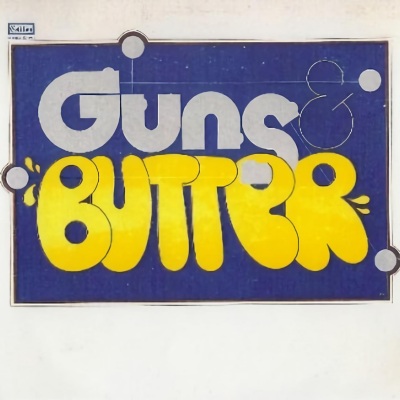
Guns & Butter
Review by ClemofNazareth Guns & Butter were a band probably doomed to failure from the very start, victims of both changing times and musical tastes as well as an obvious socio-cultural chasm between them and most of what would have needed to be their target audience for them to be successful. From their academic band name to the musical and social pedigree of some of the members (Lenny Federer was a classically trained on violin in Europe, New York and Israel while Rich Ploss studied at the renowned Berklee College of Music), the band was bound to end up as something of a novelty act that failed to translate their appeal to record executives into something more popular and lasting. The Cohen brothers Peter and Paul, along with vocalist Jeff Lyons scored a record deal with Atlantic while barely out of high school, but it would take the addition of Federer, Ploss and drummer Peter Tucker to turn them into a true band. Following a period of local gigs doing covers and derivative tunes the band managed to put together enough original music to fill an entire album. The folk and progressive influences are obvious; the Beatles (particularly McCartney), Donovan, a little West Coast psych in addition to classical structures as varied as Baroque, some strident Wagner-leaning keyboard arrangements and plenty of fuzz guitar as well as playful violin/flute interplay. In the end it's as hard to describe as it is to classify, and therefore almost by definition too narrowly-defined to achieve mass appeal. The Federer tunes are the easiest to identify, filled as they are with complex arrangements focused on carefully crafted chord sequences that leverage the orchestral instruments like flute, violin and keyboards that sound like a spinet much more than guitar, bass or even drums. The nearly eight-minute "Sometimes" is the most obvious, while the opening "I Am" also throws in some saxophone and inflected, embellished Romance-era percussion and guitar flourishes. "Time Has Wings" is the other Federer composition and this one is centered almost exclusively on the violin with some understated, Eastern-sounding guitar and folksy vocals. On the other hand Paul Cohen seems to have preferred a more pop direction with the light and melodic "Look at the Day" as well as "Our Album", a song that sounds for all the world like it was recorded at the corner of Haight and Ashbury in late 1968. But Ploss is the most varied and interesting composer in the group, ranging from the British-folk inflected "It Can't Go on Like This" to "Lady Grey" which would pass for a California 70s soft-rock tune were it not for the jazzy saxophone solo that fills the middle of the tune. And "Elysium's Butterfly Comes" though brief is one of the more haunting and arresting songs on the album with it's creepy, strident violin score and soothing, supportive acoustic guitar. This guy really should have stuck with it even when the band imploded. Unfortunately there is almost no information about this band following the release and immediate disappearance of this album. Given the times (1972), its not surprising such an eclectic fusion of folk, classical and progressive music would not take off. Still, too bad such an interesting and promising group couldn't have either formed five years sooner or somewhere besides New England; if so, they might have lasted long enough for at least one more try. A solid three star effort for this one anyway, and a hearty recommendation to fans of folk, classically-inspired rock and any of a wide range of sounds that came out of the Boston area from the mid sixties pretty much all the way to today. peace
